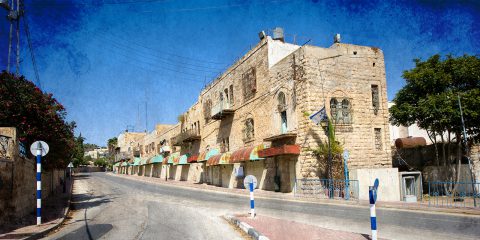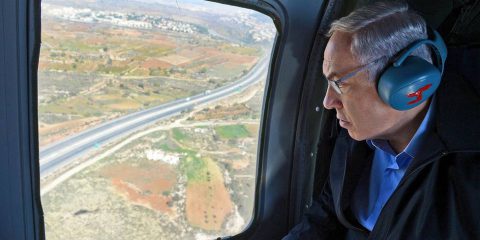A special simulation game on sovereignty was played by experts of the Jerusalem Institute for Strategy and Security, in cooperation with Israel Hayom. The exercise resulted in partial annexation.
By Nadav Shragai, Israel Hayom, 02.07.2020

There’s nothing quite like a good story to get a simulation game going. But in the case of extending sovereignty, the attempt to predict and imitate reality makes the need for a supporting story unnecessary. The simulation game held this week by the Jerusalem Institute for Strategy and Security in cooperation with Israel Hayom showed that sovereignty itself is a paradigm and premise breaking situation. Almost all the building blocks used by the simulation participants were taken from reality, the thing that has already proven in the past that it exceeds all imagination.
The “game” lasted three hours. It showed just how complex the decision will be. Its repercussions will be felt around the region and the world. Not everything became clear during the simulation; there were still many issues that remained unsolved. Others became clearer. The Netanyahu-Gantz government eventually decided to apply sovereignty to parts of Judea and Samaria, and the results of the dramatic move were felt on the ground almost immediately. The long–term effects remained vague. The move would have financial, international and security costs for Israel, but – at least based on the results of the game – nothing that Israel couldn’t handle.
The participants of the simulation reviewed here include:
Maj. Gen. (ret.) Yaakov Amidror, formerly the national security adviser, and the Anne and Greg Rosshandler Senior Fellow at JISS, as the national security adviser to the prime minister; Professor Efraim Inbar, former director of the Begin–Sadat Center for Strategic Studies and currently president of JISS, as Prime Minister Benjamin Netanyahu; Robert Silverman, a retired diplomat with the US State Department, as US President Donald Trump; Dr. Joshua Krasna, a JISS fellow who served at the Israeli Embassy in Jordan and was head of the research department at the Prime Minister’s Office, as the voice representing Jordan and the Arab world; Dr. Emmanuel Navon, a JISS fellow and an international relations lecturer at Tel Aviv University, as the voice representing the EU; Col. (ret.) Dr. Eran Lerman, vice president of JISS, and former deputy director for foreign policy and international affairs at the NSC, as Palestinian Authority President Mahmoud Abbas and other Palestinian factions; and Micky Aharonson of JISS, who was head of the foreign relations directorate of the NSC, who moderated the discussion.
Three days before extending sovereignty
Aharonson: Friends, we are 76 hours before the cabinet session on applying sovereignty to parts of Judea and Samaria. The National Security Council is now drafting the decision for the cabinet in the form of four options, and around this table now sit many of the players that will take part in this event. The first speakers will be the Palestinian side.
Abbas (Lerman): “I will state at the beginning – our objection to this move will not be violent. We will block roads across the territories that the Zionist occupier plans to annex, especially route 90 and the road known as the Alon Road, but we will not make the same mistakes of the past and of my predecessor, we will not use firearms.
“We asked Egypt to hold an emergency summit of the Arab League and of our friends Indonesia, Kuwait and South Africa to bring forward at the Security Council a proposition that in addition to condemnation, will cite Clause 7 of the UN Charter and allow for imposing sanctions and even the use of force in order to return international peace and security. We are also initiating a call on the Prosecutor of the International Criminal Court in the Hague and asking her to indict, under Article 8 of the Rome Statute, the prime minister of Israel, the defense minister, the [IDF] chief of staff and others.”

Jordanian Foreign Minister Ayman Safadi (Krasna): “Mr. President of the PA – Jordan as well will not idly stand by in the face of the Israeli move, which is meant to close the door on the two-state solution. We will re-examine whether the gas deal between Israel and Jordan still serves our interests. We decided to recall our ambassador for discussions and re-examine the pace and scope of improving relations.”
Q: Are you considering an annulment or cancellation of the peace agreement with Israel? Or are you taking into consideration the possibility that Israel will leverage the special status you have on the Temple Mount in order to placate you?
Safadi (Krasna): “All options are on the table, but we hope Israel will come to its senses before we have to think about steps concerning the peace agreement. As for the Temple Mount, I am clearly warning that if Israel goes down this path, we will see it as a severe breach of the peace agreement, and it will have repercussions for all Muslims around the world.”
Hamas-Gaza (Lerman): “We won’t initiate provocations, but we also won’t prevent our people from responding. If the Iranians ask us to fire a few rockets to send a message to the Jews, we won’t be able to stop it.”
The EU (Navon): “The EU continues to support the two–state solution and sees the unilateral annexation as a breach of international law, of the Geneva Conventions and Resolution 2334 of the Security Council. Just as the EU has imposed sanctions on Russia, due to the annexation of Crimea, it will also impose sanctions on Israel. We will reexamine the participation of the EU in building the natural gas pipe between Israel, Cyprus, Greece and other EU countries. We presumably will not be able to include Israel in the Horizon 2021 research and development program for scientific and industrial cooperation, and we will significantly downgrade our economic ties with Israel, as we did with Russia.”
Listen to Kushner or Friedman?
Trump (Silverman) also sits at the table. “Diplomacy,” he says, “is not my forte. I have simple principles. First: beat my Democratic challenger in the elections. Anything that helps me in that – I’ll support. Anything that gets in my way – I’ll block. The second principle is keeping the friendship and alliance with Israel.”
He also takes a swipe at Jordan: “It needs to take into consideration that it needs the US” On the issue of agreement between Netanyahu and Gantz, as a condition for a green light from the Americans for sovereignty, Trump (Robert Silverman) says somewhat moderately: “We don’t interfere in internal Israeli affairs, but prefer broad agreement.”

Q: Mr. President, there are reports about different attitudes towards the plan. Ambassador Friedman pushes for the immediate application of Israeli sovereignty, while your son–in–law demands that Israel first commit to no further demands on Area C, on which Israeli sovereignty will not be applied.
Trump (Silverman): “Friedman is an excellent ambassador, but the one who represents my view is Kushner, I will listen closely to what he says.”
Aharonson: Cabinet ministers are convening to decide. The national security adviser, Yaakov Amidror, will now address them.
Amidror: “Gentlemen – this is a diplomatic–ideological decision that we will not make, but we will present to you the security-diplomatic picture. First, it’s important to understand – for the world, the US plan breaks all paradigms and conventions we’ve gotten used to. There is fear amongst certain people that annexation will terminate the possibility for negotiations. For the Palestinians, this could be the end of hope and the loss of the path and purpose of the Palestinian Authority. Although the American plan keeps the principle of the two–state solution, the borders are not based on the 1967 lines, rather, on reality and Israel’s security needs. There is no mention of what is called the ‘right of return’, and the demands from Palestinians for their state are significantly higher than anything seen till now.”
Aharonson: What options does the government have?

Amidror: “I’ll name four: The first, to suffice with applying sovereignty over the Jordan Valley. The second option is to annex the greater Jerusalem area: Ma’ale Adumim, E-1 areas, Gush Etzion, the Shmuel HaNavi range or areas that widen the Route 443 corridor, and the areas that overlook the airport at Lod. The third option: to apply Israeli law on settlements alone, and not the areas between them. That will prevent the addition of even one Palestinian to the State of Israel. It’s annexation without Arabs and without changing borders – only settlements. And the fourth option – to annex the territories, including the Palestinians living in them, on the basis of the concept map that the US proposed [30% of the land].”
An ideological vote
“We tried to ask ourselves,” Amidror tells the ministers. “What will the world be able to swallow? It’s about principle, not logic, and there’s basically no major difference between one kind of annexation or another. For everyone, except the Americans, it’s a unilateral annexation, but in the end, of all the work we’ve done, the last two options of annexation – the US concept map or each of the settlements by themselves – will most probably cause more outrage, because it’s harder to justify them. These two annexations have no justification other than ideology.”
Amidror adds a caveat: “In the past, the experts, myself included, were wrong when we spoke about the expected reactions around the world to many unilateral steps, like moving the US Embassy to Jerusalem. We spoke of many threats, but nothing happened. I still remember my time as head of the National Security Council. Everyone spoke of a diplomatic tsunami, but it didn’t even rain. It’s hard to estimate what the reaction will be, but for sure – there will be a reaction, and there are certain circles we need to take into consideration…”
Aharonson: Go on.

Amidror: “As for the Palestinian reaction – we must consider a wide range of reactions, from organized riots by the PA to organized terrorist chaos. The Palestinians will allow various bodies to act. I believe there will be many lone wolf attacks, and it will of course be the end of security coordination between us and the PA, with all the resulting consequences. Abu Mazen [Abbas] will also try to push for a campaign for international recognition of a Palestinian state. In the Security Council the US will block the resolutions against us, but in other UN institutions – we’ll get hit.
“In Gaza,” he continues, “the reaction will very much depend on the level of arrangement we will have with Hamas on the day it happens. The higher it is – the more Hamas will hesitate to act in a way that will cause them losses. What’s difficult to estimate is how far the Islamic Jihad will go, and how much its activity will lead to deterioration [on the ground]. My recommendation, Mr. Prime Minister, is to limit our responses to firing from the Jihad, assuming that Hamas will not join the campaign, at least at the beginning.
“As for the Arab states – behind closed doors they can tell you, Mr. Prime Minister, very nice things, but the street will challenge them, and they will not be able to withstand it. They will have to respond. Jordan will not annul the peace treaty because it needs our water, but it will dramatically reduce the cooperation. It will not be pretty. I suggest being very careful with the Jordanians, and to stop explaining to them how dependent they are on us. They don’t like hearing it. Egypt? It will respond with great restraint. They have urgent issues in the Sinai – I cannot say here how much we’re helping them. Europe? We’ve already heard here. A response with a certain amount of punishment. “Horizon 2021″ is a soft spot for us. The US? The prime minister is a better expert on this than I, but our main problem is the liberal side in American society, in the Democratic party, and the Jewish world. They will go against us all the way. Our relationship with the liberal side of US society will only get worse.”
PM Netanyahu (Inbar): “What do you recommend, advisor?”
Amidror: “To prepare the army and the Shin Bet for the worst when it comes to the Palestinians. To prepare for responses from Gaza, at first from the Islamic Jihad, but slowly it may deteriorate. The Foreign Ministry must prepare a PR campaign. It will be complex but it doesn’t have a choice. Make sure the US will support us against any possible legal procedures in the Hague, and one more thing: we must not accept a plan that will tear apart Israeli society. One of the greatest mistakes of Oslo was that it didn’t take into consideration those who thought Oslo is a disaster. The more united we are, the easier it will be to deal with what will happen.”

Q: Some of the ministers here will decide according to the answer for one question: does the plan bring us closer to or further away from a Palestinian state?
Amidror: “The schedule pushes a state further away, because it’s more difficult for any Palestinian to enter negotiations based on the conditions that will be created after implementing the plan on the ground. On the other hand – in principle – it very much eliminates Israel’s ability to deny in the future the founding of a Palestinian state. So, in the short term, the option of a Palestinian state is postponed. In the long term, the plan raises the chances for a Palestinian state.”
A question for Abbas: “As the government convenes, a terrorist attack happens on the road to Alon Moreh. A family is shot. There are dead, injured. Israel calls on you to assist in capturing the murderers. In the past you have assisted. And now?”
Abbas (Lerman): “We never handed over Palestinian warriors. But we moved aside.”
Q: Will you move aside this time, as well?
Abbas (Lerman): “We made clear in the talks between Majid Faraj, head of our intelligence, and Nadav Argaman, head of your Shin Bet, that if the Israeli government will clearly commit to the principle of two states, and if there are concrete gestures towards Palestinians – it will make it easier for the Palestinian security apparatuses to adhere to my guidance and act firmly to prevent a violent outburst.”
Total acceptance
Netanyahu (Inbar): “First, before I summarize and announce the government decision, I must clarify: the IDF and security forces will successfully deal with any violent reaction; we will continue to assist Egypt in its campaign against Jihadist elements in the Sinai; we will try to change the passive policy of the US in Libya, and will work in Washington towards greater understanding for Egypt’s security needs. As for Jordan – we’ll keep the peace treaty, including their special status on the Temple Mount.

“I will now read the government decision which was unanimously accepted: Israel completely agrees to the ‘Deal of the Century’ that was announced in January 2020. This plan recognizes Israeli sovereignty in a united Jerusalem and the legality of Jewish settlement in Judea and Samaria. It also takes into consideration the security needs of the State of Israel and gives us a historic opportunity to set long term facts. Simultaneously, the Deal of the Century recognizes Palestinian needs. It is different from previous peace plans which were not realistic and only gave false hope to Palestinians.
“Government members – not only are we getting the US’s blessing, the plan is being implemented with wide national support in Israel – a strategic asset in itself. As a first stage, the cabinet has decided to apply Israeli law on areas around Jerusalem and the wider Jordan Valley. ‘Greater Jerusalem’ is in the Israeli consensus. The area where Israeli law will be implemented includes Maale Adumim in the east, Givat Ze’ev north of Jerusalem, and Gush Etzion south of the capital. All these places will have territorial contiguity. The Jordan Valley is part of the defensible borders that Israel needs, and therefore we’ll implement Israeli law on all the Valley, from the river to the Alon Road, except for Area A, like Jericho or al-Auja, whose status will not change.”
Q: Mr. Prime Minister, is there a date for a second stage of sovereignty on the rest of the Jewish settlements in Judea and Samaria?
Netanyahu (Inbar): “We need to reach an agreement with our partners. It’s a unity government. We’ll do things with national agreement. Some of our coalition partners do not currently support the implementation of the whole plan. You also heard the range of considerations from the national security advisor, and therefore we decided to minimize the size of annexation that the Trump plan allows for.”
Aharonson: The PM has announced his decision. I would like to update you about the ongoing situation in the world and Israel at the moment: Commanders in the Jordan Valley report their counterparts on the Jordanian side are not reacting to calls for meetings or discussions. There was an attack in Judea and Samaria against Israelis with live fire. A boy was killed. There was a price tag attack in a village that was annexed, where Palestinians were injured, and as a result the world is now claiming Israel cannot defend Palestinians in the area it has annexed. The towns around Gaza have been fired upon. Rockets have also landed in Ashkelon. Dozens of Palestinians tried to climb over the Gaza fence, they were killed, and protests around the world are growing.
“The EU is having urgent discussions on imposing sanctions against Israel. The Arab League, including the Gulf States, are condemning Israel, there are protests against Israeli and US embassies around the world and lone wolf attack attempts. There is also a report of a suicide attack by a Palestinian opposite the US embassy in Jerusalem. Iran and Nasrallah are calling to unite forces in the Muslim world against Israel, and for violent action that will prove to Israel how severe its actions are.
Q: And let’s assume that armed Tanzim militia in different parts of the West Bank begin to shoot at Israeli citizens, and there are Palestinian policemen defecting and joining them. How does the PA deal with that situation that we remember from the Western Wall tunnel riots?

The Palestinians (Lerman): “Abbas’ message is clear: anyone who tries to divert the Palestinian struggle to places that serve the interest of the Zionist enemy are traitors and agents that will be dealt with the necessary means.”
Amidror: “I will recommend to the cabinet that it approve a clear policy: whoever shoots – is shot at. Beyond that, the commanders in the field will use their discretion according to the situation on the ground.”
Will Biden roll back support?
Towards the end of the simulation the participants took off their “costumes” and answered questions posed by Israel Hayom. Lerman estimated that the PA would not collapse due to the application of sovereignty, mostly because it’s a financial system that feeds tens of thousands of people and “milks the international system.”
Amidror ruled out the possibility that Hamas would succeed in destabilizing the rule of the PA: “Both we and they are aware of this possibility. The society in Ramallah understands that a Hamas regime means throwing them off the third floor with their hands tied behind their back. They had proof of that in Gaza.” I suggested the possibility that these events would lead to another declaration, a third one, of the founding of a Palestinian state, and that the world countries would again recognize this state.
The last part of the discussion was devoted to the possibility that Democratic candidate former Vice President Joe Biden would win the US presidential election this November. Silverman believes that in this case, Biden would roll back the American recognition of Israeli sovereignty on parts of Judea and Samaria. Other participants in the discussion disagreed and estimated that there would be room for negotiations and softened wording towards Israel, even if Biden is elected.
Some of the participants in the discussion said that both the Obama and Trump administrations created precedents of reversing decisions made by their predecessors: Obama canceled the letter from President Bush given to Prime Minister Ariel Sharon. The letter recognized the reality of “settlement block”. Trump acted similarly concerning many decisions of the Obama administration, especially when it came to Israel. Therefore, there’s no reason to assume that if Biden is elected his administration would act any differently.
Read the 26.06.2020 Hebrew original of this article at https://www.israelhayom.co.il/article/774611






 - בניית אתרים
- בניית אתרים